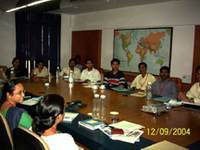::KNOWLEDGE POINTS::
If you wanted to earn knowledge points, you should have attended the learning session on the 11th of September at Kale Consultants in Mumbai. Sanjit Pal from CCG India Pvt. Ltd gave an enriching presentation on why companies deploy a Knowledge Management (KM) solution and how companies actually benefit from such a solution.
Sanjit started his presentation by reasoning that some software projects fail to stick to deadlines because there is a lack of critical information transfer between team members. When new members are added to a project or teams change, time is primarily spent on handing over explicit knowledge – that which is captured in documents and databases – among team members. But very little time is spent in capturing tacit knowledge – that which resides in people, their experiences etc. Infact, in most cases there is only a handover and no knowledge transfer.
Sanjit opined that a KM solution could be used as an effective tool for sharing tacit knowledge among employees. In addition to capturing knowledge about customers, processes and products, a KM solution could also be used to harness intellectual capital.
He added that for a KM initiative to be successful top management support and a clear definition of business benefits is essential. The organization must employ systematic processes and an effective information and communications infrastructure. There needs to be a cultural change among employees and they should be encouraged to continuously learn and share.
The highlight of Sanjit’s presentation was the case studies of KM implementation of which the case study on Patni’s Enterprise KM initiative provided the attendees wonderful insights on the benefits of KM.

The Attendees

The Kale Session
Patni had thousands of technical documents from various projects that its sales and marketing division wanted to utilize effectively. These documents had to be collected from various locations from Patni’s global operations and sorted for quick retrieval.
For the KM initiative, Patni chose Livelink over MS-Sharepoint Portal and BroadVision because Livelink offered a combination of content management, document management and knowledge management capabilities. Oracle 9i, IIS, ASP pages, and SQL Query were the other technologies used. The project team consisted of nine members - project managers, project leads, programmers, and a document uploader.
The KM solution was rolled out to employees in the second phase. Employees were awarded Knowledge (K) points for contributing their learning in projects and were encouraged to participate in discussion forums. The KM initiative was promoted through the use of notice board and teaser campaigns.
While Patni had to face some technical and non-technical issues, it benefited from the KM solution as the turnaround time for responding to Request for Proposal (RFP) reduced by 40-45% and proposal building accelerated by 50%. Also the discussion forums provided a common space for resolution of technical queries.
The learning session ended with a lively discussion where the attendees shared their views and experiences on KM practices in their respective companies. The attendees went home earning valuable K points eagerly looking forward to the next learning session.
1 comment:
Thanks for writing this.
Post a Comment